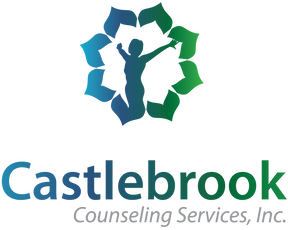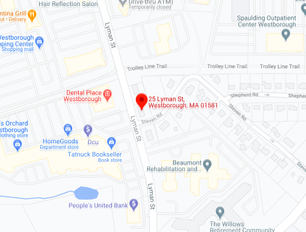Clinician Spotlight: An Interview with McKenzie Sheridan, MABy Lauren Chapin, LICSW
Welcome to the fifth installment of Clinician Spotlight, a series where I sit down with some of our wonderful therapists for a cozy conversation about work, mental health, and many life tidbits in between. Most recently, I had the opportunity to speak with McKenzie Sheridan, MA. We are so excited to welcome McKenzie to the Castlebrook team for the next year while she finishes up her Doctoral program in Clinical Psychology. McKenzie discussed how she cultivates a safe space in her therapy room, her focus on the LGBTQIA+ population, and her jungle of house plants. ******** Lauren: Hi McKenzie, welcome to Castlebrook! Thank you for sitting down with me to chat. Could you begin by telling me a bit about your educational background and what brought you to private practice? McKenzie: I have wanted to be a therapist since childhood. I first earned my bachelor’s degree in psychology from Simmons University and then took a year off working in a group home for teen girls who were trauma survivors. I really enjoyed the work and appreciated having that hands-on experience before diving into my master’s in mental health counseling at Boston College. I then transitioned directly into the PsyD program in clinical psychology at William James College where I am currently in my fourth year. I have about two years left, and I was looking for a way to continue my clinical experience and gain some personal fulfillment because I just love therapy so much. While working under the supervision of Dr. Beth Anderson (another wonderful Castlebrook clinician!) at Worcester Recovery Center and Hospital, I fell in love with Dialectical Behavior Therapy. We discussed the possibility of working at Castlebrook to develop a DBT group for trans and gender non-conforming youth, and now it’s a dream come true for me. I’m here for one year before my next internship. Lauren: We’re so grateful to have you. You spoke about your experience at the hospital and a group home, what other settings have you had the opportunity to work in? McKenzie: I’ve done a lot of work in schools and community mental health settings such as integrated behavioral health within medical offices, crisis response, and a day shelter for women experiencing homelessness. I also held an internship practicing individual therapy where my youngest client was 3 years old and my oldest was 62. Lauren: You’ve had such a variety of experiences during your training! McKenzie: That was very intentional on my part. I knew that the setting really drives the experience and I wanted exposure to as many as possible to figure out where I thrive and where I see myself serving people in the most helpful way. I’ve learned a lot and to be honest, I'm still not sure, but I'm excited to keep figuring it out. My primary experience so far has been working with children, adolescents, and families. I really love working with the little ones, but my current population of interest is adolescents and young adults that are in the LGBTQA+ community or hold other historically marginalized identities. Lauren: You mentioned starting a group for this adolescent population. How did you come up with the idea for the group? Did you recognize a service gap? McKenzie: Yes, actually. It was a combination of that, current socio-political climates, and the direction my training took me in. I really dove into group work over the last year and loved it. Laws across the country are telling Queer youth that they are not allowed to be who they are. Here in Massachusetts, our community has more protections but they are still exposed to that message. External support, access to affirming care, and visibility of gender nonconforming joy are crucial, and unfortunately not a guarantee. One of the tiers of DBT treatment is finding community, and I thought creating a DBT group directly for this population would be a great way to readily incorporate community building into treatment. So, when clients come into this group, they’re in one protected space together where they can safely explore, grieve, and tackle some of that deeper stuff with others who share that experience. Lauren: That’s wonderful. You had mentioned some research too! What has that research been about? McKenzie: My research has been broad, but with a focus on trans and gender nonconforming youth, their experiences in therapy, and their experiences with trauma. Some of my research has looked at which aspects of treatment are found to be helpful and not helpful, and how these pieces are not always aligned between the identified client and their family. My doctoral project research has shifted a bit to queer people in general and identity formation. I am exploring the experiences of identity development of queer individuals who come out later in life and what the implications of that are. Lauren: That sounds like necessary research! Going back to your comment of always wanting to be a therapist, why is that? McKenzie: I was like a moth to a flame with therapy. Before wanting to be a therapist, I wanted to be a teacher. I loved working with kids, helping people, teaching new things, and learning new things. However, I didn't like a lot of the bureaucratic work that came along with it. I found myself feeling more invested in the emotional experience of children and how this often gets in the way of their academic or social success. Further, when I worked at the group home, I discovered that I didn't necessarily want to be managing schedules and talking around the dinner table. I wanted to help them with what was going on inside on a deeper level. I really love looking at things from a global perspective and looking at all of the moving pieces. Lauren: As you’re preparing to take on clients and build your group, what is something that you want prospective clients to know about the type of therapy space you try to cultivate? McKenzie: It’s important for my clients to know that I view the therapy space as not just a space of vulnerability, but a space of authenticity. You can be exactly who you are, no more and no less, and I am on your team. I really love the idea of unconditional positive regard and that’s very present in a lot of my therapeutic relationships. I think that one of the most magical things about therapy is that you get to have a person outside of your everyday life who is on your team and is there to specifically support you. There is no way to win or fail at therapy, you just show up as you are and do your best. Lauren: I like that message. Are there any other favorite metaphors or sayings that you use and have found effective? McKenzie: I love metaphors. One of my favorites that I've adapted over the years is to imagine that you are a juggler and the challenges of life are the juggling balls. You're constantly trying to keep them all up in the air, but this actually isn’t the most important piece of the work. The most important part is to figure out which balls are made of glass and which are made of rubber. Because when you drop a ball, and you will, some of the balls will shatter and some of them will bounce. I use that with myself and with clients. Lauren: That sounds really helpful when thinking about priorities and all of the different life domains we deal with. Speaking of life domains, besides work, what else brings you joy and keeps you motivated? McKenzie: There’s an independent music artist that I've been listening to a lot named Maddie Zahm. She writes a lot of raw, vulnerable, autobiographical stuff about who she is and figuring out what kind of life she wants to live. I love everything she puts out. She’s genuine even when it hurts. I’ve also been really into house plants these last couple of years. I started out propagating plants from leaves I bought online and now my hobby has grown to include over 100 house plants! Lauren: Amazing. I’ll definitely have to give Maddie a listen! Thank you, McKenzie, for chatting. I can’t wait to follow more of your work as you continue your journey here at Castlebrook.
0 Comments
Your comment will be posted after it is approved.
Leave a Reply. |
Archives
May 2025
Categories |
Mission Statement
Castlebrook Counseling Services, Inc. is a group of private practice clinicians with a shared goal of strengthening our community by providing therapy and clinical support designed for children, adults, and families to successfully meet life’s challenges.
 RSS Feed
RSS Feed

